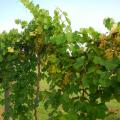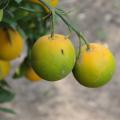Tree Fruit: What are chill hours?
Mississippi's winter chilling information
Deciduous fruits and nuts stop growing in late summer or fall, drop their leaves, go dormant during the winter, and then resume growth in the spring. This relationship between plant and environment is important to the survival of the plant. Growing plants that are non-hardy and incapable of becoming hardy need dormancy during winter for survival. In areas where winters may fluctuate between cold and mild temperatures, species have developed long chilling requirements, so they will not begin to grow in midwinter even though it may warm up to growing temperatures for several days.
Endodormancy (rest) is defined as that period when buds are dormant because of internal physiological blocks that prevent growth even under ideal external conditions for growth. Chilling termperatures above freezing terminate endodormancy. Chilling hours are defined as period of time between 32º F and 45º F. Plants are assigned a certain chilling requirement based on the amount of cold needed to cause 50 percent of the buds to break and flower in the spring. Most blueberries have a chilling requirement of 400-600 hours. Peaches are planted using the chilling requirement as a criteria for variety selection and range from a low of 400 to a high of 1250. Average chilling hours during the winter in Mississippi are: Hattisburg - 400-600; Jackson - 600-800; Mississippi State University - 800-1000; and Holly Springs - 1000-1200.
In 1999, middle to lower Mississippi experienced a low chilling hour accumulation. There is a material (Dormex) that can be sprayed on the commercial plantings that will substitute for about 200 hours. This material is a restricted-use pesticide and can damage the plant if used improperly. Dr. John Braswell, Dr. Frank Matta, and I have asked for, and received, a Mississippi Label for this material.
Dr. Arlie Powell (fruit specialist in Alabama) has performed research and demonstrations with Dormex in Alabama for over 10 years. Information concerning Dormex can be found on their web site, Alabama Winter Chilling
At this time, we feel that we will accumulate sufficient chilling hours in Mississippi. However, some growers may be interested in discussing the use of Dormex in late Febuary.
Publications
News
RAYMOND, Miss. -- This year, Julie Bounds was expecting a bumper crop of blueberries. What she could not anticipate was the excess amount of rainfall her family’s blueberry farm would receive. This untimely rain has been the biggest challenge for growers across the state.
Fruit production requires considerable effort, and some fruits require much more care than others -- facts specialists with the Mississippi State University Extension Service keep in mind as they provide research and information support to the industry.
MSU has ongoing blueberry research at the South Mississippi Branch Experiment Station in Poplarville and the Beaumont Horticultural Unit, and muscadine research at Beaumont and the McNeill Research Unit. MSU also has trials and research on blackberries, wine grapes, elderberries, passion fruit and strawberries.
RAYMOND, Miss. -- A statewide citrus quarantine was issued recently for Mississippi after one of the most serious citrus plant diseases in the world was detected in the state. Citrus greening, also known as Huanglongbing or HLB, was confirmed earlier this year, according to a press release from the U.S. Department of Agriculture’s Animal and Plant Health Inspection Service, or USDA APHIS. There is no cure for the disease, which is caused by a bacterial infection spread by the Asian citrus psyllid, a gnat-sized insect. Infected trees die within a few years.




